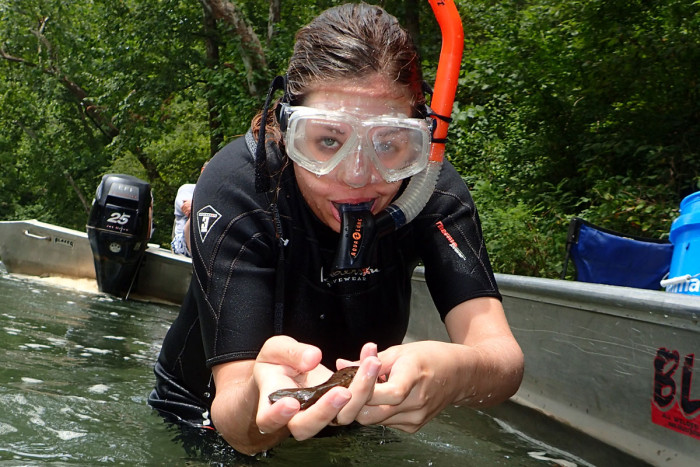Students to raise awareness about conservation medicine at zoo event
Saint Louis Zoo, other institutions partner on One Health Fair
 Courtesy of Saint Louis Zoo/Mark Wanner
Courtesy of Saint Louis Zoo/Mark Wanner Amanda Pedigo, hellbender keeper at the Saint Louis Zoo, releases a juvenile Ozark hellbender in the Eleven Point River in southern Missouri. The endangered amphibian will be one of several topics to be discussed Saturday, April 6, at the One Health Fair at the Saint Louis Zoo.
Washington University School of Medicine students will help lead discussions on topics including the positive impact of vultures, pollinators and Ozark hellbenders on the environment and human health Saturday, April 16, during the One Health Fair at the Saint Louis Zoo.
The free event — which runs from 9 a.m. to noon — is co-sponsored by the zoo’s Institute for Conservation Medicine and the newly formed One Health student group at the School of Medicine.
Saint Louis University School of Medicine and the University of Illinois College of Veterinary Medicine are also sponsors.
One Health is a worldwide initiative aimed at understanding the relationship between human, animal and environmental health. It involves a multi-disciplinary approach to medical research and health care that involves physicians, veterinarians and scientists.
“One Health at WUSM, our new student group, is tremendously excited to be involved in the One Health Fair at the zoo,” said Dean Odegard, a first-year medical student who founded Washington University’s student group. “Research, collaboration and an interdisciplinary approach to complex problems threatening the health of humans, animals and the environment — that’s what One Health is all about. Our hope is that this will be the beginning of a long and fruitful future of collaborations.”
About 35 students from the universities — along with zoo staff, including veterinarians, educators and zookeepers — will offer 10 presentations on animals, conservation challenges and links to human public health at information tables throughout the zoo.
Topics to be discussed include:
- Vultures: How the declining vulture population is causing human health issues.
- Pollinators: How dwindling populations of bees, bats and butterflies threaten ecosystem health and global food production that relies on pollination.
- Ozark hellbenders: How this endangered species of aquatic amphibians contribute to improved water quality in rivers in Missouri and Arkansas.
- Orangutans: How the establishment of palm oil plantations is destroying orangutan habitats and the species’ survival.
- Nature and childhood: How exposure to nature plays a crucial role in the positive development of children.
- Climate change: How melting ice negatively affects Alaska Natives and polar bears.
- Zoonotic pathogens: How modern diseases, including epidemics, can originate as viruses, bacteria, fungi or parasites passed between animals and humans – and how such diseases not only threaten human health but also wildlife conservation.
- Water quality and availability: How poor water quality and lack of availability threaten animal and human health worldwide.
- Lemurs: How the loss of lemurs in Madagascar pose serious health issues to the island nation’s residents and ecosystems.
- Camels: How climate change has led to an increase in camel numbers in Kenya and, more broadly, how poor health in camels and other livestock is a major threat to human health and wildlife conservation.
“The One Health Fair provides a venue for veterinary and medical students to come together with Zoo staff to research topics that span water quality, to pollinator loss, to emerging infectious diseases of wildlife and humans,” said Sharon L. Deem, DVM, PhD, director of the zoo’s Institute for Conservation Medicine.
“The teams of next-generation planetary health professionals will then share these stories with zoo visitors, demonstrating the One Health holistic approach necessary to address the conservation and health challenges of today,” added Deem, who is also president of the American College of Zoological Medicine.
The School of Medicine also will be a key participant in the Consortium for One Health inaugural symposium Sept. 30 at the zoo. The keynote speaker will be Barbara Natterson-Horowitz, MD, a cardiologist at UCLA who helped spur the One Health movement with her 2012 best-selling book, “Zoobiquity: The Astounding Connection Between Human and Animal Health.”







